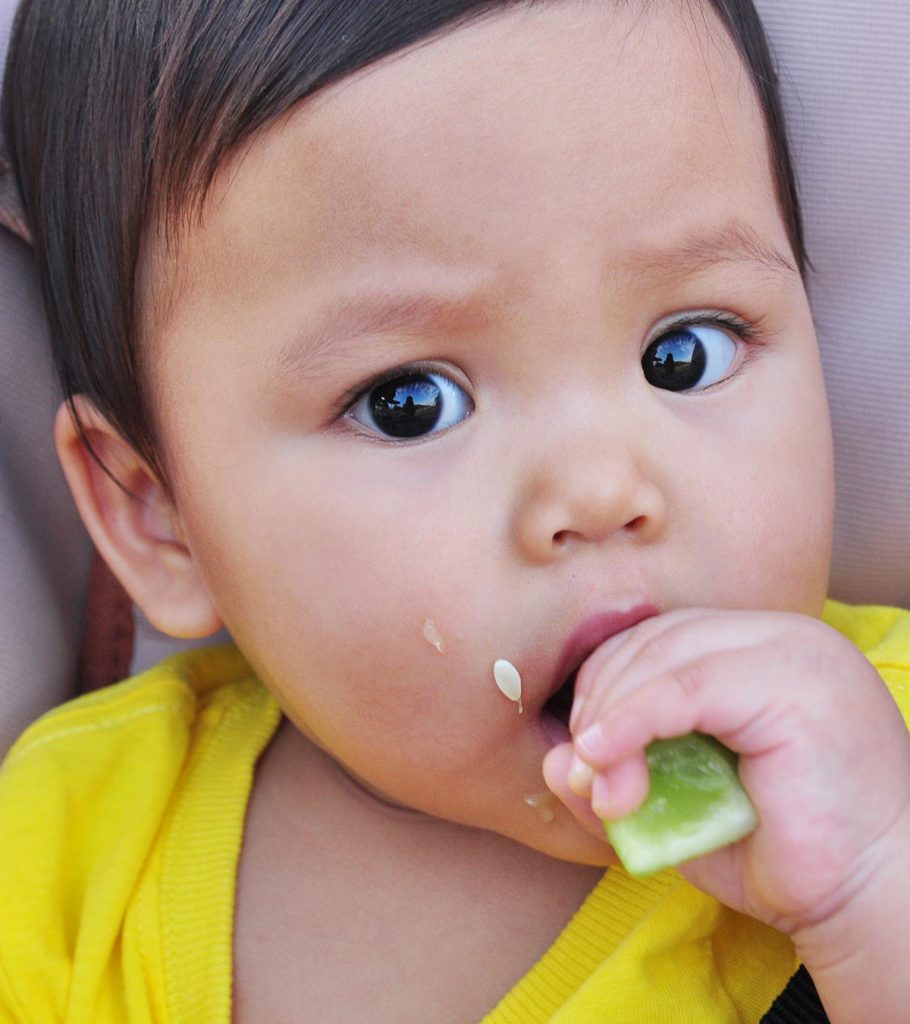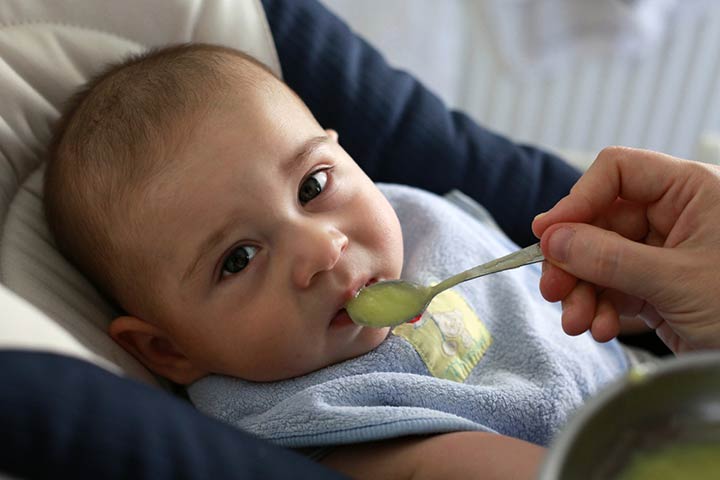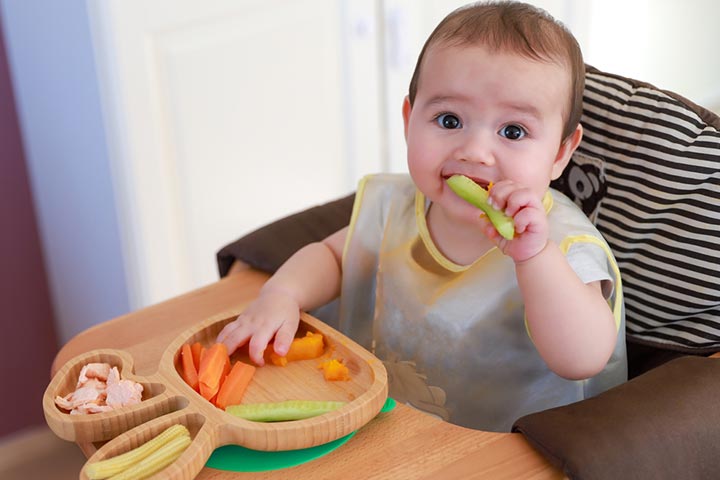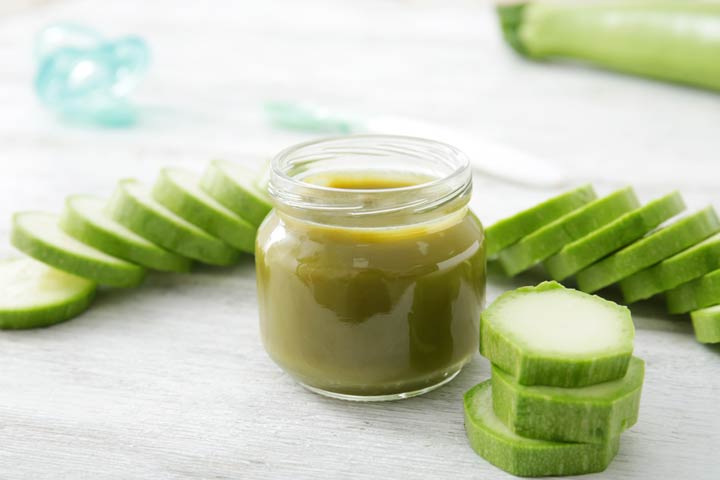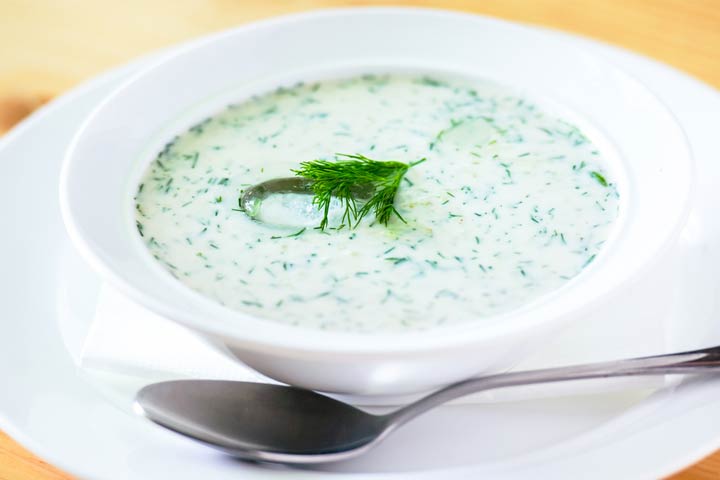You may introduce cucumbers for babies older than eight months to increase their overall vegetable intake. Cucumber or Cucnmissativus is a fruit with high water content, phytochemicals, and micronutrients. A baby’s digestive system may not be mature enough to digest some contents of cucumber. Raw cucumbers may cause abdominal discomfort even if they eat fresh veggies and fruits.
So, you can add cucumbers in pure form after boiling them to avoid abdominal gases and other discomforts. Read on to know more about cucumbers for babies, the right age to start feeding this fruit, and how to incorporate this low-calorie food into your baby’s diet.
Is It Safe For Babies To Eat Cucumber?
Babies can safely eat cooked cucumber in a mashed or pureed form with other solid foods in their weaning diet once they are about nine months old. However, in the case of raw cucumber, it is considered appropriate to wait up to 12 months to avoid gastrointestinal issues caused by cucurbitacins. Cucurbitacins are compounds found in plants from the Cucurbitaceae family and several other plant families (1).
Nutritional Value Of Cooked Cucumber
One cup (180g) of cooked cucumber gives the following nutrients in comparison to the recommended dietary allowance of these nutrients (2) (3) (4).
| Name | Amount | RDA |
|---|---|---|
| Water | 168g | – |
| Energy | 32.4Kcal | – |
| Carbohydrate, by difference | 8.03g | – |
| Total dietary fiber | 1.08g | – |
| Calcium, Ca | 34.2mg | 270mg (7-12 months) |
| Magnesium, Mg | 27mg | 60mg (7-12 months) |
| Phosphorus, P | 48.6mg | 275mg (7-12 months) |
| Potassium, K | 292mg | 700mg (7-12 months) |
| Sodium, Na | 518mg | 200mg (7-12 months) |
| Vitamin C, total ascorbic acid | 4.86mg | 35mg (7-12 months) |
| Folate, total | 10.8µg | 35µg (7-12 months) |
| Vitamin K (phylloquinone) | 36.2µg | 10µg (7-12 months) |
Sources: U.S. Department of Agriculture, World Health Organization, and National Institutes of Health
Possible Health Benefits Of Cucumber For Infants
Like melon, squash, and pumpkins, cucumber is a versatile and nutritious food with several nutrients that can contribute to an infant’s nutrition needs. Its use in traditional Indian medicine has been prevalent since ancient times. Most of these medicinal properties of cucumber are attributed to its phytochemical composition.
- Hydration: Cucumbers have high-water content, making it a natural source of hydration. Half a cup of cooked cucumber (90g) contains approximately 85 grams of water and necessary salts that can hydrate your baby. Thus, cooked cucumber puree may work as suitable food for (2).
- Essential nutrients: Cucumber contains considerable amounts of vitamins and minerals, such as sodium, potassium, and phosphorus. Although not an iron-rich food, it contains small amounts of iron and vitamin K, necessary for various body functions, such as bone development (2).
- Antioxidants: Research shows that the aqueous extract of cucumber contains flavonoids and tannins that have antioxidative and analgesic effects (5). Antioxidants are vital for fighting free radical damage and provide immune system support.
- Skin health: Topical application of fresh cucumber juice is a natural remedy for nourishing and soothing the skin. It is also known to reduce swelling and alleviate sunburns (6). However, the suitability of cucumber in babies for skin issues is not adequately studied.
- Growth and development: Cucumber contains folate, an important nutrient that helps your baby’s overall growth. Besides, it contains silica that helps in strengthening tissues and joints (7).
- Overall health: Cucumber, when consumed with peel, can help ward-off chronic health conditions, such as diabetes and cardiovascular problems in the long run. These benefits are attributed to the presence of micronutrients and bioactive compounds, such as cucurbitacins (8).
Some parents also use cucumbers as a teether for their babies (9). An anonymous blogger and mother of three children shares how she uses cucumbers as teething sticks for her daughter. She says, “Cucumbers make great teething sticks. We cut ours into 3-4 cm strips (rather thick) and let 6-month-old Sprout (her child) gnaw on them while we ate our dinner (which included fresh cucumbers for us as well). We prefer the English variety, or ‘hothouse’ kind that has tiny, edible seeds. Sprout was very happy to chew on these, and wow, those little gums clamp down hard enough to bite down, so just watch to make sure no big chunks go in (i).”
You can also squeeze a peeled cucumber piece (to avoid choking) and give it to the baby to chew on. However, this should be done under a watchful eye as small pieces can pose a choking risk.
Precautions To Take While Feeding Cucumber To Babies
Here’s a quick look at certain precautions you may take while feeding cucumber to your baby.
- Wash the fruit thoroughly. Cut a slice of the cucumber and taste it because some cucumbers can be overly bitter.
- You can retain the peel while cooking the cucumber. If serving the fruit raw to a toddler older than 12 months, then too you may retain the peel.
- Introduce cucumber in pureed or mashed form for easy digestion.
- Feed only properly cooked cucumber to babies younger than 12 months to avoid gastrointestinal issues.
- Start feeding a small amount and gradually increase as per your baby’s comfort.
- Do not add any other new foods to your baby’s diet while introducing cucumber. Follow a “three-to-five-day wait rule” to check allergic reactions, if any.
- If you or anyone in the family has an allergy to cucumber, then consult a pediatrician before feeding cucumber to your baby.
- If you observe signs of abdominal discomfort, such as gas, eliminate cucumber from the diet for a few days. Reintroduce after pediatric consultation.
- Once the baby seems comfortable with the mild taste of cucumber puree, you may mix cucumber puree to purees made from other vegetables and fruits.
- For older babies and toddlers, who have already started finger foods, thick cucumber slices can be served as healthy finger food.
- If your baby is diagnosed with cucumber allergy, then do not serve any food that contains cucumber, even in small quantities.
How To Select And Store Cucumber?
Below are some steps that you can follow to select and store cucumber safely.
How to select the cucumber
- Buy fresh, firm, and unwaxed, pesticide-free, organic produce (10).
- Pick the ones that are green and have fewer blemishes and pits.
- Choose crisp, firm cucumbers over shriveled or withered ones.
- Avoid cucumbers that are large and yellow.
How to store the cucumber
- Wash cucumbers thoroughly under running water.
- After patting dry, store in the refrigerator for a week.
- Try to keep the cucumbers in a zip-lock pouch at the front rather than stacking them at the back.
- Avoid storing in bulk as cucumber loses moisture quickly.
Quick And Delicious Cucumber Recipes For Babies
Cucumber may be introduced in pureed or mashed form. Once your baby gets comfortable with its taste, you may try some of these recipes. Once your baby gets comfortable with its taste, you may try some of these cucumber-based homemade baby food recipes.
1. Cucumber and pear puree
This is simple to prepare and can help promote the baby’s digestive health. Adding some more fruit purees to this recipe is a personal choice.
You will need:
- 1 cup cucumber (peeled and sliced)
- 1 cup pear (peeled, cored, and diced)
- Water
How to:
- Mash the cucumber slices with a fork.
- Put mashed cucumber and pear into a blender and blend well. Ensure no lumps are left.
- Add 1/4 cup water and blend again to make the paste smooth.
- Serve immediately with a pinch of jaggery powder on top for added flavor.
2. Cucumber yogurt mix
As an easy-to-digest, quick snack, this great recipe is a nutritious pre and probiotic mix that is gut-friendly. You can feed this recipe to your baby as a side dish, too.
You will need:
- 1 small cucumber (peeled and diced)
- 1 cup papaya
- 1 cup plain yogurt (or Greek yogurt)
- ¼ cup mint leaves
- ½ tsp jaggery powder (optional)
How to:
- Put mint leaves, papaya, and cucumber in a blender and blend until you get a smooth paste. Ensure no lumps are left.
- Add ¼ cup water in case the paste looks too thick. Add water until the blend has a softer texture.
- Mix the blend with yogurt and give it a thorough whisk. Ensure there are no lumps.
- Add jaggery powder for added flavor.
- Serve fresh to your baby.
3. Cucumber mint cooler
A quick and refreshing drink for a quick cool down during hot summers. While this original recipe uses honey, you may avoid its addition or replace it with jaggery powder for babies below 12 months.
You will need:
- 1 handful of fresh mint (shredded)
- ½ cup hot water
- 1 cucumber (peeled and deseeded)
- 1 small lemon
- 1tsp jaggery powder (optional)
How to:
- Add shredded mint leaves to a pitcher.
- In a glass, stir together jaggery and hot water.
- Chop the cucumber and add to the pitcher along with the jaggery water.
- Squeeze lemon juice into the pitcher.
- Use an immersion blender to blend this mixture.
- Cool, strain, and serve fresh.
Cucumber for babies is a healthy addition to their diet after nine months of age. However, if you wish to give them raw cucumber, you may have to wait until one year. Adding cucumbers could help maintain hydration and add a good nutritional value to your baby’s balanced diet. If your baby is below 12 months, you may give the fruit steamed, cooked, or baked. However, older infants may enjoy cucumber in various food items, such as sandwiches, shakes, and salads.
Key Pointers
- Babies over 8 months can safely eat cucumber, which is rich in nutrients and antioxidants.
- Cucumber offers hydration, aids growth and development, and benefits skin health.
- Cooked cucumber can be mashed or pureed, while raw cucumber can be given to children over one.
- Choose firm, green, unwaxed cucumbers, and store them in the fridge after cleaning and drying.
- Two tasty recipes to introduce cucumber to your baby’s diet are cucumber and pear puree, and cucumber yogurt mix.
Learn how to make a delightful cucumber puree that is perfect for your six-month-old. This recipe offers a nutritious and tasty snack or meal, ensuring your little one receives essential nourishment.
